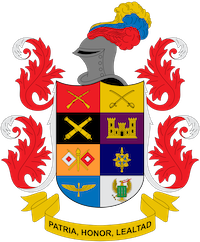Intelligence and Security, two different concepts, but particulary complementary
Abstract
The studies of security have starring the research in the fields of international relations and political science since the attacks of the 9/11 in 2001, even when the security has been the fundamental objective of the states its creation itself. However, military intelligence has been little studied in the academical literature as instrument to achieve the security, and on the contrary, it has been neglected as unknown activity. For this reason, this article presents the found results of a research project named Intelligence as element of national power yet little studied, developed during the year 2015 in three research phases, which applied a methodology of documentary review and interviews to experts, with the objective to show that the intelligence is an object of the disciplines in question, dueto it is the means to guarantee the aim, national security.
Downloads
References
Aldrich, R. y Kasuku, J. (2012 ). Escaping from American lntelligence: culture, ethnocentrism and the anglosphere. lnternational Affairs, 88(5),1009-1028. https://doi.org/10.1111/j.1468-2346.2012.01116.x
Bai, J. y Lagunoff, R.(2011). On the Faustian dynamics. The Review of Economics Studies, 78(1), 17-48. https://doi.org/10.1093/restud/rdq022
Bailey, J. y Dammert, L. (2005). Public Security and Po/ice Reform in the Americas. Pensilvanya, United States: Pittsburgh. https://doi.org/10.2307/j.ctt7zw885.6. https://doi.org/10.2307/j.ctt7zw885.19. https://doi.org/10.2307/j.ctt7zw885.17
Dougherty, J. y Pfaltzgraff, R. (1990). Teorías en pugna en las relaciones internacionales. Nueva York: Harper Collins Publishers.
Fondo Fiduciario de las Naciones Unidas para la Seguridad Humana. (2012). La seguridad humana en las Naciones Unidas. Nueva York.
Fuerzas Militares de Colombia-Ejército Nacional. (1993). Manual de inteligencia de combate. Bogotá: Imprenta Ayudantía General Comando Ejército.
Halliday, F. (2002). Introducción : La pertinencia de lo internacional. En Las relaciones internacionales en un mundo en transformación. Madrid: La Catarata.
Halliday, F. (s. f). lnternational Relations and its contents. lnternational Affairs, 71(4) , 733 -746. https://doi.org/10.2307/2625095
Herman , M. (1996). Intelligence power in peace and war. Cambridge University Press. https://doi.org/10.1017/CBO9780511521737
Hinsley,F. y Simkins,C. (19 90). British intelligence in the Second World War. Nueva York: Cambridge University Press.
Hoffman, S. (1991) . Jano y Minerva. Ensayos sobre la guerra y la paz. Buenos Aires: Grupo Editor Latinoamericano.
Hough, P. (2004). Security and securization. En H. Peter (Ed.), Understanding Global Security (pág. 260). Londres: Rout ledge.
Jeffrey,K. (2010). M/6:The history of theSecret lntelligence Service 1909-1949. Londres: Clays Limited.
Johansen,R. (1995). Swords into plowshares: Can fewer arms yield more Security? En C. Kegley (Ed.), Controversies in international relations theory. Realism and the neo-liberal challenge. Palgrave Mcmillan.
Johnson, L. (2010). The Oxjord Handbook of national security intelligence. Nueva York: Oxford University Press. https://doi.org/10.1093/oxfordhb/9780195375886.001.0001
Katzenstein, P. (1996). Conclusion: National security in a changing world. The Culture of national security. Norms and identity in a world politics. Columbia University Press.
Keohane,R. y Nye, J. (1987). Power and intedependence. Revisited. Intemational Organization, 41(4), 725-753. https://doi.org/10.1017/S0020818300027661
Macrakis, K. (2010). Technophilic Hubris and espionage styles during the Cold War. (T. U. Press, Ed.). Isis, 101(2), 378-385. https://doi.org/10.1086/653104. PMid:20718278
McGrayne, S. (2011). The theory that would not die: How Baye's Rule Craked the Enigma Code. Yale University Press.
Méndez, J. A. (1998). La inteligencia en las operaciones de mantenimiento de la paz. Recuperado de https://dialnet.unirioja.es/descargar/ticulo/4643360.pdf
Mintz, A. &. (2010). Understanding foreign policy decision making. Nueva York: Cambridge University Press. https://doi.org/10.1017/CBO9780511757761
Morrison, J. (1997). lnteragency coordination in military operations other than war. Rand Corporation.
Office of Training and Education. (s. f.). Analytic thinking and presentation for intelligence producers: OTE.
Organización de las Naciones Unidas. (26 de junio de 1945). Carta de las Naciones Unidas. Recuperado de http://www.cooperacionespañola.es/sites/default/files/carta_de_naciones_unidas.pdf
Padelford, N. (1949). Review politics among nations: the struggle for power and peace. Polítical Science Ouartely, 64(2), 290-292. https://doi.org/10.2307/2144235
Ramonet, l. (2004) . Pensamiento único y nuevos amos del mundo. En l. Ramonet y N.Chomsky, Cómo nos venden la moto. Bogotá: Talleres Fica.
Ratcliff, R. (2006) . Delusions of intelligence: enigma, ultra, and the end of secure ciphers. Londres: Cambridge University Press.
Russell, R. (2007). Debunking Cold War myths. Sharpening Strategic lntelligence. Why the CIA gets it wrong and what needs to be done to get it right. Cambridge University Press. https://doi.org/10.1017/CBO9780511509902.003. https://doi.org/10.1017/CBO9780511509902 PMid:17913222 PMCid:PMC2562397
Russett, B. &. (2001). Triangulating Peace. Democracy, interdependence and international Organizations. United States of America: Norton & Company.
Toffler, A.(1991). Powershift: Knowledge, wealth and violence at the edge of 21st Century. Bantman Paperback.
Toffler, A. (1991). Powershift: Knowledge, wealthand power at the edge of the 21st Century. Mass Market Paperback.
Toffler, A. y Toffler, H.(1997). Las guerras del futuro. Barcelona: Plaza y Janes.
Villamizar, A. (2004). La reforma de la inteligencia. Un imperativo democrático. Bogotá: Fundación Seguridad y Democracia.
Wirsing, R. (1973). Political power and information: a cross-cultural study. American Anthropologist New Series, 75(1), 153-170. https://doi.org/10.1525/aa.1973.75.1.02a00090
Zegart, A. (1999). Flawed by design: The evolution of the CIA, JCS, and NSC. California: Stanford University Press.













